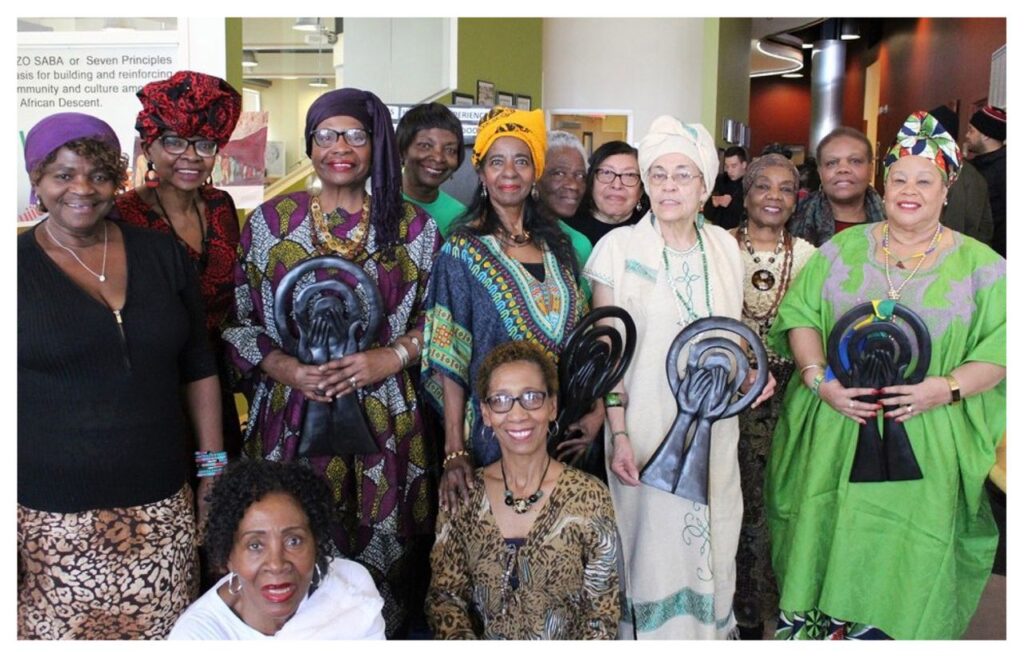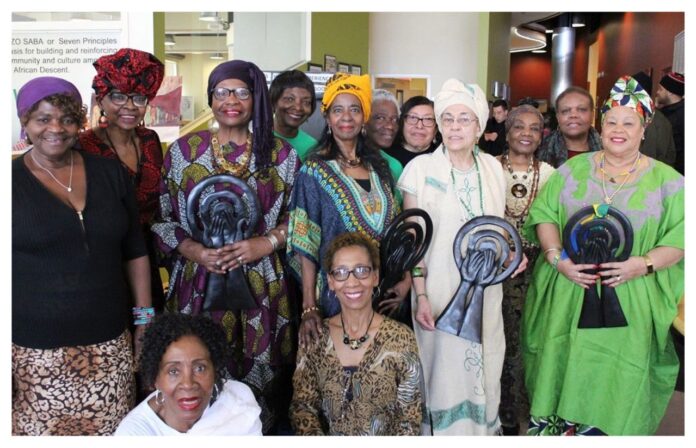Liben Gebremikael, Suzanne Sicchia, Suleyman Demi and Justin Rhoden
CMAJ October 31, 2022 194 (42) E1448-E1450; DOI: https://doi.org/10.1503/cmaj.220456
KEY POINTS
- An Afrocentric approach to Black health promotes culturally meaningful health care grounded in the values, worldviews, lived experiences and histories of Black people of African descent.
- Afrocentric community health care can disrupt systemic anti-Black racism and related health inequities.
- Founded on the philosophy and practice of ubuntu and on the Nguzo Saba or “Seven Principles,” TAIBU, a nonprofit community health centre in Scarborough, Ontario, applies Afrocentrism to disrupt anti-Black racism in the health care system and provide holistic, culturally appropriate health care to Black communities in the area.
- Black health is determined more broadly than is typically imagined in conventional Western models of the social determinants of health; further dialogue, reflection, intellectual and cultural humility, learning and unlearning are needed to fully realize the potential of an Afrocentric model of care.
The disproportionate burden of SARS-CoV-2 on racialized and ethnoculturally diverse neighbourhoods,1,2 coupled with the Black Lives Matter movement and related global protest against police and state brutality, has helped raise awareness of systemic anti-Black racism and related health inequities. Across Canada, Black-led advocacy for racial justice and health equity has fostered support for and adoption of race-based data collection, explicit attention to diversity and inclusion in hiring and retention, recognition and celebration of Black excellence and joy, and contributed to growing calls for culturally relevant, anti-oppressive, trauma-informed care grounded in an Afrocentric approach. We describe the Afrocentric approach to health used by TAIBU, a community health centre that serves Black-identifying communities in the Greater Toronto Area (GTA).
What constitutes an Afrocentric approach?
Molefi Kete Asante (an American professor and philosopher and leading figure in the fields of African–American, African and communication studies)3 defined Afrocentricity as “a mode of thought and action in which the centrality of African interests, values, and perspectives predominate.” In essence, Afrocentrism asserts and celebrates the right of people of African descent to strive for self-determination, which in turn implies a need for Afrocentric ontologies, epistemologies, methodologies and metrics.
Founded on the philosophy and practice of ubuntu and on the Nguzo Saba or “Seven Principles,” TAIBU (an Afrocentric nonprofit community health centre [CHC] in Scarborough, Ontario) has taken up this call. TAIBU is a Kiswahili greeting that means “be in good health.” The CHC’s aim is to end systemic anti-Black racism and promote and preserve Black health through an intersectional, equity-based, anti-racism and anti-oppression framework that exposes and disrupts the violent effects of racial privilege.4
Ubuntu is an ethic of justice and collective or shared humanity5 that roughly translates to mean, “I am because we are” — a knowing of oneself and humanity by seeing and nurturing the humanity of others. The philosophy and practice of ubuntu, found in many African countries and traditions, captures the relational spirit of an Afrocentric worldview.5 In a 2019 systematic review, Ewuoso and Hall explained that ubuntu prizes relationships of “interdependence, fellowship, reconciliation, relationality, community friendliness, harmonious relationships, and other-regarding actions such as compassion above all else.”5 However, in a 2016 discourse about ubuntu ethics, Ujomudike described ubuntu as centring on “reciprocity, common good, peaceful relations, … human dignity, and the value of human life as well as consensus, tolerance, and mutual respect.”4 Ubuntu is considered essential to self-actualization, and living a good and principled life.4–7
In a 2016 article, Maulana Karenga described the Nguzo Saba as “standards for personal and social excellence directed towards building and sustaining moral community and strengthening and maintaining the community’s capacity to define, defend, and develop its interest in the most positive and productive sense.”8 The principles are drawn from diverse African cultures and traditions and include Umoja (unity); Kujichagulia (self-determination or the freedom to define, name, speak, advocate and create for oneself); Ujimaa (collective work and responsibility); Ujamaa (co-operative economics); Nia (collective purpose); Kuumba (creativity); and Imani (faith in humankind). The principles encourage an understanding of Black people and their rich heritage that celebrates and cultivates Black joy, love, excellence, and collective strength and well-being. The principles also offer Black people a way to “affirm and strengthen family, community and culture” and aid in “building a peaceful and harmonious togetherness in [their] struggle for freedom, justice, peace, and human flourishing in the world.”8 In these ways, the Nguzo Saba can help with the practice and realization of ubuntu.4
TAIBU community health centre’s application of the Afrocentric approach
Established in 2008 with funding from Ontario Health, TAIBU provides comprehensive primary health care, mental health support and social services in combination with health promotion programs and activities for Black communities in the GTA, including Black Francophone communities. The CHC has developed a Black Governance & Leadership Project (Box 1) and has strong working relationships with other Black-led and Black-serving agencies in Toronto and Canada, including the Black Health Alliance. During the COVID-19 pandemic, in partnership with Scarborough Health Network and the Black Physicians Association of Ontario, TAIBU coordinated SARS-CoV-2 vaccination clinics for Black communities in the GTA. As of May 2022, the clinic had administered more than 39 000 vaccine doses.
Box 1: Additional resources
- More information about TAIBU and its Black Governance & Leadership Project is available at https://www.taibuchc.ca/en/interrupt-racism/
- A list of the services that make up the Ubuntu Village Project is available at https://www.taibuchc.ca/en/taibu-community-services/cares-for-seniors/
TAIBU is distinct from other health agencies because of its commitment to Afrocentrism, with ubuntu and the Nguzo Saba at the heart of its vision and practice. Alongside other social determinants of health, these principles are considered important determinants of the health of Black people and their communities. Indeed, it is difficult to imagine how a person or community can be healthy in the absence of a sense of purpose, belonging and connection, collective work, self-determination, dignity, justice or the joy that comes from being immersed in the rich inheritances of one’s ancestry and culture.9–11 Delivering health care informed by ubuntu and the Nguzo Saba, therefore, constitutes a powerful anti-colonial practice capable of disrupting systemic anti-Black racism in Western medicine.
The Ubuntu Village Project
The Ubuntu Village Project exemplifies the use of Afrocentric principles in health promotion at TAIBU. The project received funding from the Ontario Trillium Foundation and is expanding in 2 Neighbourhood Improvement Areas in South Scarborough and Northwest Toronto with support from the United Way’s Allan Slaight Seniors Fund.
The Ubuntu Village Project (Box 1) engages more than 3000 older adults in activities spanning 24 programs to promote and maintain a healthy lifestyle and successful aging.12 The project strives to create a space that cultivates a deep sense of connection, purpose and well-being that can enable older adults to age successfully in the community.12 An advisory committee comprising older adults and professionals leads the development, construction and direction of the Ubuntu Village. Additionally, specially trained Peer Leaders serve on the Ubuntu Elder Council and facilitate the services offered.
An initial asset- and skills-mapping exercise identified the interests and capacities of the community’s Black and racialized seniors, and the gaps in service for this population. The findings of this work fed into a capacity-building phase where several older adults completed peer leadership training and certification, empowering them to lead many of the Ubuntu Village’s programs. These leaders facilitate more than 30 weeks of activities in the community (Figure 1).12


Figure 1:
Members of the Ubuntu Village after hosting an African fashion show during the Black History Month Celebration in 2019 (photo credit: Lieben Gebremikael).
The Let’s Get Going physical activity program has increased participants’ self-reported time spent in physical activity by 200 hours per year.12 TAIBU’s commitment to Ujimaa and Umoja is reflected in the participants coming together in friendship and feeling a sense of connection and collective responsibility for their community’s health and well-being. Kuumba is reflected in sharing stories and using music to engage participants. In these ways, a sense of self-determination, self-advocacy and confidence or Kujichagulia is encouraged. As 1 participant described, “I feel good and energetic. I will continue on my journey to energize myself and others in my group. … It is very fulfilling … I take away a lot to pass on to others.” Another participant alluded to ways in which TAIBU’s Afrocentric model promotes a greater sense of Nia and cultivates Imani, noting, “This is the first year for me here … I enjoyed so much her [the peer leader] … every time she calls me and I talk to her, you know I feel the live spirit in my body. You know that someone really cares for me. I’m living by myself, and it’s hard to live by yourself when nobody calls you. You feel lonely without someone. She livens my spirit so much and I love to hear her voice.”12
Future directions
Tremendous diversity exists in how Afrocentrism, ubuntu and the Nguzo Saba are defined and taken up. At TAIBU, Black health is understood to be more than the absence of disease or infirmity and is determined more broadly than is typically imagined in conventional Western models of the social determinants of health. The Afrocentric approach to Black health that TAIBU advocates reflects this understanding, and it permeates all of its work with and in service of the community to promote and preserve Black health and reverse and correct the effects of racial privilege. But we are in the early days of articulating Afrocentric models of health care for and in the Canadian context. More dialogue, reflection, intellectual and cultural humility, learning and unlearning are needed to fully realize the potential of an Afrocentric model of care that is capable of disrupting (the effects of) oppressive systems, structures and practices that undermine the health and well-being of Black communities.
In the spirit of ubuntu, TAIBU extends an open invitation to join them in this important and necessary dialogue because, as the African proverb states, “if you want to go fast, go alone, but if you want to go far, go together.”
CMAJ invites contributions to Innovations, which highlights recent diagnostic and therapeutic advances. Novel uses of older treatments will also be considered. For publication, the benefits of the innovation, its availability and its limitations must be highlighted clearly. Submit brief evidence-based articles (maximum 1000 words and five references) to http://mc.manuscriptcentral.com/cmaj or email andreas.laupacis@cmaj.ca to discuss ideas.
Footnotes
- Competing interests: None declared.
- This article has been peer reviewed.
- Contributors: All of the authors contributed equally to the conception, intellectual content, and drafting and revision of this manuscript; gave final approval of the version to be published; and agreed to be accountable for all aspects of the work.
This is an Open Access article distributed in accordance with the terms of the Creative Commons Attribution (CC BY-NC-ND 4.0) licence, which permits use, distribution and reproduction in any medium, provided that the original publication is properly cited, the use is noncommercial (i.e., research or educational use), and no modifications or adaptations are made. See: https://creativecommons.org/licenses/by-nc-nd/4.0/
References
- ↵
- Eissa A,
- Lofters A,
- Akor N,
- et al
- ↵
- Tai DBGT,
- Shah A,
- Doubeni CA,
- et al
- ↵
- Asante MK
- ↵
- Ujomudike PO
- ↵
- Ewuoso SH,
- Hall S
- Metz J
- ↵
- Ramose MB
- ↵
- Karenga M
- ↵
- Edwards S,
- Makunga N,
- Ngcobo S,
- et al
- Tarkang EE,
- Pencille LB,
- Komesuor J
- ↵
- Unombana NJ
- ↵Ubuntu Village Project: our journey [interim internal report]. Toronto: TAIBU Community Health Centre; 2019.Google Scholar
Source: Research report was originally published in the Canadian Medical Association Journal [https://www.cmaj.ca/content/194/42/E1448]







